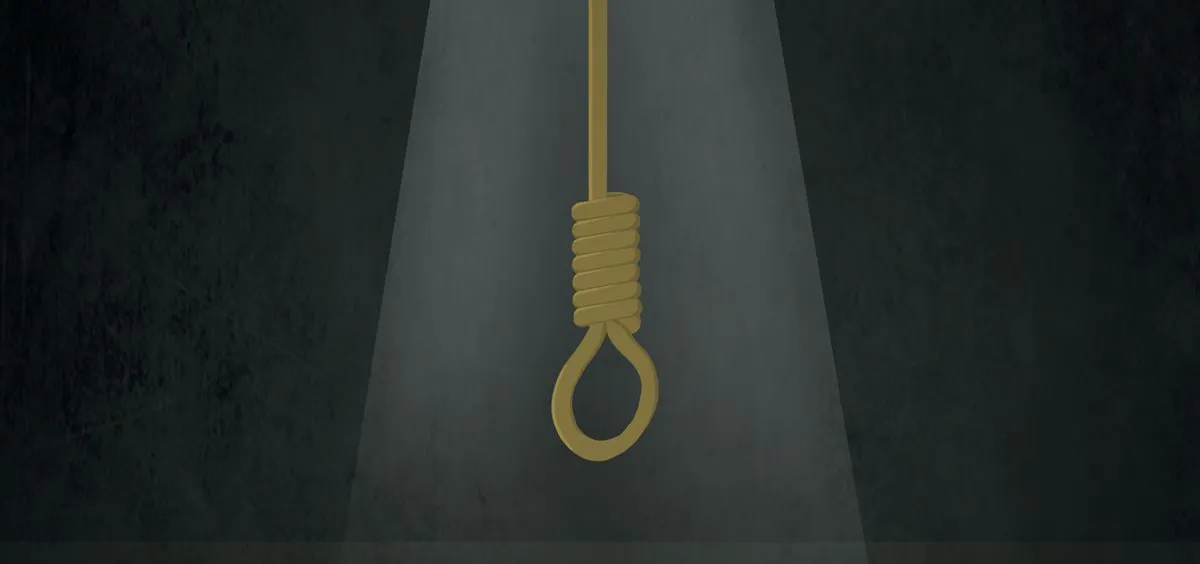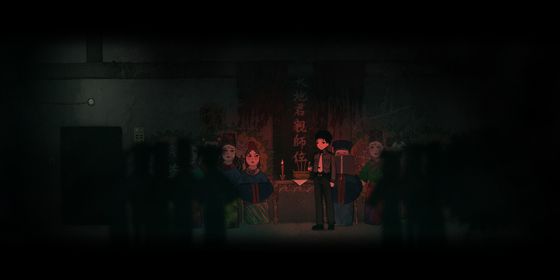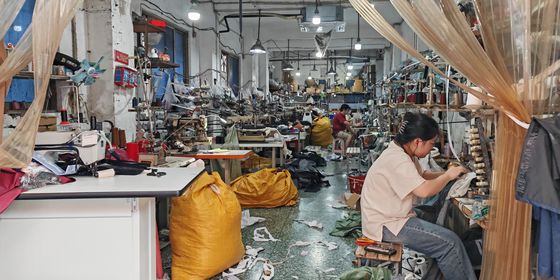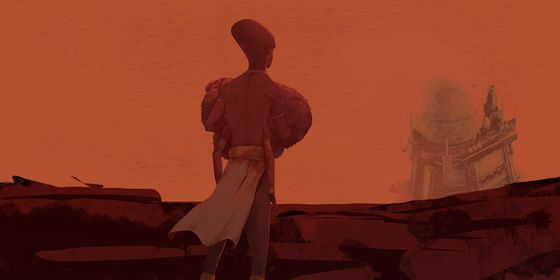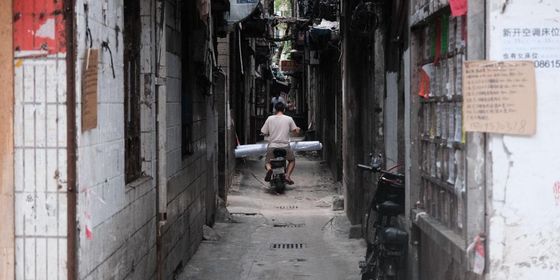A tale of mystery and murder in Guangzhou
About the Author: Su Gengsheng 苏更生 used to be a journalist for iRead magazine, and she is now a popular columnist, a sharp-tongued book critic, and a not-so- prolific but well-received fiction writer based in Beijing. Her style is placid and slow-paced on the surface, but with an innate power and intensity. For her, “Writing is a lonely battle between myself and the world.”
My name is Su Gengsheng and I’m a reporter. In my limited experience writing news, I’ve dealt with more than a few deaths.
It all happened when I was approaching graduation and interning at a local paper, working the emergency beat. There was a whole team of trainees. We spent the day sitting by a hotline waiting for someone to call and break a story. Emergency news covered suicides, fires, explosions, vehicle collisions, and murders. Once a month, there was some kind of tragedy. But in July that year mysterious things started happening at an unusual rate. A few of them, I can remember, were terrifying. It all goes back to those haunted buildings.
I’m not superstitious, and I’ve never seen a ghost, but those rooms and the buildings they were in chilled the blood in my veins. At the time, my life was going terribly so I didn’t dwell on those fears. Being an intern was humiliating: working for nothing, people bossing me around, all in a race to get hired. That month my classmates found jobs in swift succession while I continued to intern. I was living with my boyfriend, Qin Hao, in an old area of the city. He had already found work and would be leaving for Beijing in a few weeks.
One afternoon the paper got a call: there had been a hanging in an apartment. A few interns and I rushed to the scene. Police had sealed the area and the building’s entrance was under guard. Our lead reporter, Xu, ordered us to split up, investigate the neighborhood, and ask around for details. I circled the compound. It was old and dilapidated with six-storey cement buildings. They looked like dozens of neatly arranged grey boxes docked to the pavement. A few neighbors whispered in a doorway, so I shifted closer to eavesdrop. The hanging was a suicide, a migrant woman who had lived there with her husband for three years. That day after lunch she started the dishes and her husband went to take his noon nap. When he woke up, her body was dangling in the middle of the room.
Those were enough facts for a small story, but it still wasn’t clear why she had committed suicide. I jogged back to her building. The cop guarding the entrance had disappeared. I slipped inside and hurried up the stairs to the victim’s apartment—301. I was scared. I didn’t know if the corpse had been removed. When I found the room, a pair of legs stuck out into the hall. The hairs on my body sprung up and my sweat cooled. This was Guangzhou in July, when temperatures reach over 36 degrees Celsius. The door was ajar, the woman’s body placed next to it and blanketed in a white sheet.
It wasn’t very scary. The head wasn’t showing. But there was a chill in the air that made me panic. The unease that drifted out of the doorway made me feel colder. Something was definitely wrong with that place. It was facing south, but a curtain of green cloth hung over the window. Sunlight seeped through the lime fabric. It was eerie. Men’s shirts hung from a wire strung across the living room. A single lamp was fixed to the ceiling. It was coated in a film of grime that cast a yellowish brown light. Evening had fallen. The humid air wouldn’t have lifted, except the room was strangely frigid.
I heard a noise above. The policeman who had left his post must be returning. I had to leave. As I ran down I glanced back: the policeman was now standing next to 301. He had a birthmark running down the left side of his face onto his neck. It glowed in the green light that filtered through the curtain. Spooked, I sprinted outside.
The other interns were hanging around the newspaper’s minibus looking tired and impatient. A small story like this shouldn’t require that much effort. We put our notes together. The couple was unemployed and had spent all their time at home. Not too long ago the woman had been diagnosed with heart disease and likely committed suicide because she didn’t have enough money for treatment. The reporter listened to our findings and paused in silence. When the minibus started moving he told us that three years ago he had been sent there on an assignment. It was the same room and the same story: a woman who hanged herself.
We said nothing. Xiaowen asked, “Sir, who would you like to be in charge of writing it up?” Xiaowen had started her internship at the same time as me. She was sitting up front, right next to him. He told her to write it. Sitting in the back, staring at their heads, I twisted my mouth into a knot. I was the only one who had entered the scene and I obtained the most information, why should she get to write the piece? Getting published could lead to a full time post. Of course I minded. But I didn’t get the attention she did. At first I thought it was because she was pretty. Then, I decided that she wasn’t better looking than me, she was just a flirt.
That evening I left the paper early. Qin Hao didn’t hear me come in. He was on the phone in the bedroom. I lay down crooked on the couch. The light switch was too far to bother turning on, but I clicked on the fan, letting the cool air blow directly onto my face. The heat was ridiculous. Our apartment didn’t have an air conditioner and even if we did we wouldn’t be able to afford the electricity needed to run it. I started to think about the dead woman’s feet, but then I heard Qin Hao: “I miss you too, I’ll be there soon.” His voice was soft. He must have been speaking to a girl. It wasn’t the first time I had caught him sneaking around. The last few months it was all we argued about.
He walked out of the bedroom and jumped when he saw me. “You could at least turn on the lights,” he grumbled, walking into the toilet. I ignored him. I was trying to figure out a way to write more the next day, there was no time to quarrel. Then I realized that the issue wasn’t time. I couldn’t allow myself to argue with him. He was my only friend. I didn’t want to lose him; at least for the time being.
The woman who hanged herself became a few hundred words in the paper. Of course the bizarre parallels with the suicide three years earlier couldn’t be included in the report. Things then stayed quiet for a couple of weeks until more mysterious deaths.
It was a slow day with no news to cover. The other interns had all left for the day. But I stayed on. That afternoon there was a sudden call from the reporter. Someone had jumped off a building that was close to our office. He told me to rush over there. Here was a chance to do a story by myself. I left right away.
The compound was in an old part of the city. Apparently the residents had been relocated there ten years earlier. Each building housed eight families. The victim lived on the sixth floor and had jumped from the balcony, dying on impact. Police had already searched the apartment and were guarding the corpse in the cement flowerbeds below. One of them looked familiar, but I couldn’t remember where I’d seen him before. When they weren’t looking, I slid inside. The buildings in the compound were all a square C shape with staircases running up the middle. As usual they were built facing south in order to get the most light, but the walls of the stairwell were made entirely of concrete. I ran up, my footsteps echoing in the dark. I couldn’t see anybody, but I sensed I was being watched. It might have been someone looking through a peephole. There was nothing unusual about that. When there were incidents neighbors always watched from behind their doors.
I found the door to the victim’s apartment wide open and the balcony could be seen from the living room. Aside from a cane chair, a steel bed and some sheets of white paper littering the floor the whole place was empty. It was dusk. A gust of wind blew into the room scattering the papers. I stood in the living room and looked out to the desolate balcony and the sky darkening in the distance. All I was concerned about was collecting facts. It wasn’t until later that I realized that something wasn’t right. The apartment was too empty for anybody to be living there. There wasn’t a sign of life. Not only was there no food, but there also weren’t any sheets on the bed. When I turned around to leave I saw that the back of the door was filled with holes. They looked like the size of a fist. The wood had caved in and the inner board was showing. Looking at the holes I imagined the tenant punching the door. It was terrifying, I couldn’t imagine why someone living alone in a place like that would vent by smashing up a door.
I headed back down the stairs. A door on the fifth floor opened and an old man peered into hallway. He hissed, asking if I was a reporter and told me he knew why the man jumped. I looked at his face in the gloom. A gaunt sheet of brown skin was wrapped around his cheekbones and dotted with liver spots that looked like specks of mildew on a rotting mango. He told me the man above him was insane. Every night he would pound on his door and scream like a madman. “Did he have any family?” I asked. The old man looked straight back at me and asked, “Do you really want to know why he died?”
He leaned into my ear and said, “We’re under surveillance. We listened to the enemy’s radios together. The USA has reconnaissance planes. We’re all being watched…” As he spoke he gripped my hand and tugged. “You’re the crazy one,” I said to myself, wanting to leave. But the old man wouldn’t stop pulling my hand. He continued rambling. There was an old lady on a lower floor who collected garbage and stored it in her room. She’d been hoarding it for over ten years. Centipedes were often seen crawling out from the crack under her door. He asked if our paper could do something about it. I bolted down the stairs. He sort of lunged with half his body to grab me. I took a glance back in the dark. The old freak wasn’t wearing any clothes.
When I got outside, the sunlight stung my eyes and a fresh wave of heat enveloped me. Most of the residents were old, single and had been relocated from condemned homes, and their children weren’t around. When I rushed out, I still had the sense that someone was watching. Were all the seniors in this place peeking behind their doors? Realizing that I’d just been in a building filled with senile lunatics left me horrified.
Then I saw Xiaowen. She was joking around with Xu under a tree. I fumed. Here I was investigating a suicide alone while they flirted? Whatever happened, this time there was no way she was writing. Back at the office Xu asked me to draft the story. Xiaowen didn’t like that. She stood by his desk with a pissy scowl. Who told you to do nothing but stand under a tree eating ice cream?
That day I finished work in a good mood. I’d forgotten about the awful building. As I was leaving the office, Xiaowen gave me a nasty look, then returned to her games with Xu. Floozy! Put a bit more effort into your work!
Actually, I did get some attention. For Spring Festival the paper handed out gifts of cash in red envelopes. One department gave male interns five kuai each and females ten. I peeked in my envelope: 20. The manager was smiling at me from behind his desk. I smiled back. Creep.
A few months earlier he had asked me out incessantly. I dodged him when I could, but the previous evening he had invited all the interns out for a late-night meal. It was impossible to get away. When we finished he drove us all home and made sure to drop me off last. He turned on the radio and whispered, “Covering human interest stories is easier than breaking news.” He quietly explained that his department was missing a full-time reporter and asked if wanted to transfer. I played dumb, “Emergency news is just fine for me.” Chuckling, he dropped his hand on my knee and said, “Just think about it, I’ll call you tomorrow.” He finished by patting my thigh.
When I got home Qin Hao was packing a suitcase. He rummaged through some papers and pulled out the lease, “It’s up next month.” He’d already told the landlord to close the agreement with me. We’d rented that room for three years, splitting the allowance we each received from our parents. I wouldn’t be able to afford it alone. I didn’t take the lease, but stood in the doorway and asked, “So, what about us?”
“So what about what?”
“Who’s waiting for you in Beijing?”
“Don’t be ridiculous. Nobody’s waiting for me. You’re so paranoid…We’re just not right for each other. You know what these last months have been like.”
He put the lease on the tea table and went to bed. What did I know? Did I know that every day he was on the phone saying goodnight to someone else? He had booked his flight for the next evening, did I know that? Did it even matter?
That night I couldn’t sleep. I climbed onto the roof. We were in an underdeveloped area in a neighborhood nicknamed “The handshake”. It was a dense ghetto of cramped buildings. I could touch the neighbor’s hanging laundry just by stretching out my arm. It was the middle of the night and the alley below was still buzzing. The electronics store, pool hall, sex shop, and convenience store with the red public telephone were all open. A gang of 20-somethings were moving between the establishments, looking for trouble.
I quietly counted how much money I had left. My internship had lasted over half a year now. I didn’t have that many opportunities left. What would I say if that manager called me the next day? Weren’t all lead women in the movies strong and independent? Didn’t they get to roll their eyes at the insignificant supporting roles? Why was I such a loser? There was nobody I could roll my eyes at. I couldn’t find a job. And I was about to get dumped. Looking back, it’s hard to believe how much I was capable of tolerating. Now I know that love isn’t lost in an instant, it dissipates over time. That summer I was ready for the breakup, but I didn’t know how I was going to deal with the next month’s rent; or having nothing to call my own.
I sat on the roof until sunrise. Xu called. That night another man had jumped from a building. Inside, his nine-month pregnant wife was found stabbed to death and the attacker had not been identified. Xu ordered all the paper’s interns to sneak into compound and gather whatever pieces of information they could find. The murderer could still be on the loose. This was a big story. I grabbed an early bus to the scene. It was a high class complex with heavy security. The victims’ building faced the street and there was already a tarpaulin raised to protect the scene. I estimated that the man had jumped from so high that his body had smashed into pieces. It would be too difficult too clean up before the medics arrived.
Xiaowen appeared and we managed to eat breakfast opposite the tarp without feeling repulsed. It was almost eight. Soon people would be trickling out to go to work and take their kids to school. We’d be able to sneak in through the crowds. We waited impatiently, our clothes rumpled and hair uncombed. Xiaowen said that this beat was exhausting and she wasn’t coming in after that day. I asked why. She said she had applied to a graduate program. She was going back to school.
Just then a crowd exited the compound and when the guards weren’t paying attention we snuck through a side entrance. The victim’s building was to the right of the main gate where there was a security station. We wandered around waiting for someone to open the door and split up to avoid attracting attention. About half an hour later someone entered and I stepped in behind them. The apartment was on the eighth floor, but there was camera in the elevator so, I took the stairs.
It was a new building. The walls were inlaid with light colored tiles and the floors were made of marble. The caretakers performed regular maintenance. Everything looked clean and new. Morning sunlight shone through the glass windows. I could even see dust particles floating in the air. This was different from the other scenes I’d investigated. Everything was bright and peaceful. I listened for any sounds outside the corridor, but only heard the hum of steel cables rolling in the elevator shaft. When I reached the sixth floor I thought I heard footsteps and pressed myself against the wall.
Suddenly, a woman screamed. It was a drawn out wail that she must have kept pent up for some time. The sound of weeping penetrated the corridor walls. She screamed and screamed, banging her fists on the floor. I stood dumbstruck against the wall thinking about the murdered pregnant woman two floors above with a dead, nine-month old fetus in her stomach. The corpse was probably still in the room. My muscles grew limp at the sound of the muffled cries. Between sobs the woman was howling someone’s name. I continued listening. She must have been the victim’s mother and the police had come to collect her to identify the body.
She was crying on the eighth floor and I was on the sixth while not far away was a corpse that had carried two lives. Apparently the attacker stabbed the wife repeatedly, spilling blood all over the floor. I was losing my balance. I needed to get out of that closed space. I ran with one hand on the wall to support myself, pushed open the stairwell’s heavy steel door and charged into the open elevator. The sound of two ladies talking quietly in the stairwell echoed in the shaft: at sunrise the couple on the eighth floor were fighting and death threats were made. Then the woman screamed. The husband must have killed her. I put my ear against the back wall and listened. That was the information I needed. I should have approached them to ask for more, but I didn’t. All I could think about was how cold and slippery my sweaty palms felt on the stainless steal. I made an oath: that was the last day I would ever work for a newspaper. The elevator doors slid open and I charged passed the women out of the building.
Outside, the sun was bright and the chest-high plants were a lush, deep green color. Before I could catch my breath, a security guard approached me and took me to the building maintenance office. Xiaowen was already there. The captain asked us what we were doing sneaking around outside. We said we were visiting a friend. He said, “Oh you’re here to see a friend. Are they a tenant? They can come fetch you. But until they do, you’re not going anywhere.” He locked us in the office.
We stayed trapped inside for the whole day. The other reporters had already left. It was a huge case and the police were holding a press conference. It was getting late and I realized that Qin Hao would be boarding his flight soon. I pounded on the door shouting to be let out. I was so desperate the security guard had no choice but to let us go.
I had always been curious about how a break up would unfold. Would it be similar to a TV drama: weeping and shaking his body, screaming “Why are you doing this to me?” before spinning around to attend to my teary eyes. But as soon as I entered the apartment, he said there was no time left and that he had to run to the airport. We put his luggage in the trunk of a taxi and sat in the back. There was little traffic and the car sped along the expressway. The street lamps blurred into a rolling thread. I looked out the window at the twinkle of the city lights and the reflection of my face in the glass. We exchanged only one sentence. At the airport I stayed in the car and told the driver to turn around and take me home. We didn’t even say goodbye.
After that, I stopped going to the paper and shut myself in the apartment. I didn’t see anyone or take any calls. I spent my time moping around, watching DVDs. When I got hungry I would boil a pot of noodles then go to sleep. Guangzhou in midsummer gets violent thunderstorms. One night the thunder cracked and roared and rain gushed down into the alley. I opened the window and the sharp odor of rainwater mixing with street grime wafted into the apartment. I paced the room. I’d lived there for nearly four years with the iron bars outside the window, lacquered floor, old cane chair, wooden cabinet, and newspapers taped to the window to create some shade. The only way to see outside was to stand on the balcony. Across the alley was another destitute building. A factory used it as a dormitory for migrant workers who slept in steel frame bunk beds. The walls were plastered with Hong Kong swimsuit models.
The deluge continued as if it was planning to wash the city away. In the gloom of the lamplight, the humid room had a dull grey aura. The newspapers on the window crackled from the force of the wind; warning me that they might blow away. I couldn’t help laughing. And I claimed to have visited haunted buildings. This was the haunted room. I slammed the door and window closed, shutting myself back in the apartment. I was no longer afraid.
That night I decided to leave and return to live with my parents. Then I read in the paper that the pregnant woman’s killer was her husband. The couple had bought the apartment when they married and the wife got pregnant as soon as they moved in. The husband then developed a gambling habit and they started fighting. The night of the murder, he had just returned from a game and she started swearing at him. He stabbed her 17 times then took the elevator up to the roof and jumped 28 stories.
The article came with a picture of the tarp that Xiaowen and I had eaten breakfast in front of. Looking closely, I saw a policeman on guard and suddenly remembered he was the one that had looked familiar by the cement flowerbeds. His face was slanted and appeared to be looking at me directly. The birthmark on his face and neck was fully exposed. Cold sweat oozed from my skin as I thought back on those buildings that had terrified me. He had appeared at each one. But all three incidents were in different districts; he shouldn’t have been there. I threw down the paper; he was still staring at me. I crumpled it into a ball and that feeling of cold dread reentered my veins.
A few months later I found a job at another newspaper and became a real reporter. I took the arts and culture beat. I wouldn’t touch another mysterious story. That oath I had made in the elevator no longer mattered I guess. I heard that around the same time the other newspaper was going to give a male intern a job. Xiaowen must have known before she applied for graduate school. I didn’t remember that boy very well. We never really spoke. As for Qin Hao, I never saw or heard anything from him again.
The last time we saw each other was in the taxi. I was staring at the dim sky that canopied the city and suddenly saw the moon. I wanted him to look at it with me.
“Look, it’s a half moon.”
He was playing with his phone and glanced up before returning his eyes to the screen. “More than half.”
– Translated by Nicholas Richards (芮尼克)
“Haunted Rooms” is from our issue, “Law”. To read the entire issue, become a subscriber and receive the full magazine. Alternatively, you can purchase the digital version from the iTunes Store.





